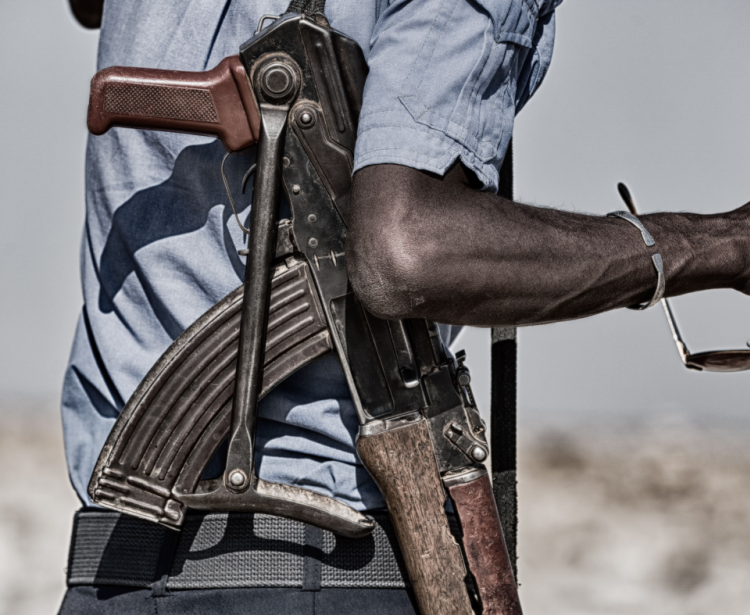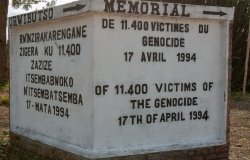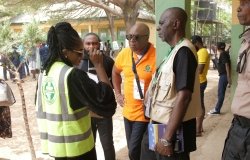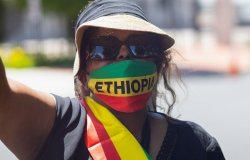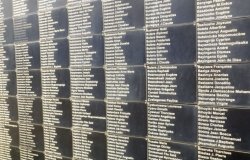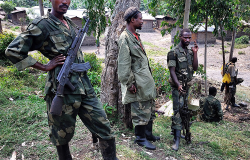
A blog of the Africa Program
Forging a Path to Peace: Navigating Transitional Justice Amidst the Proliferation of Small Arms in the Horn of Africa
Addressing the Horn of Africa’s (“the Horn”) historical conflicts and ongoing political turmoil requires focused efforts to establish the basic conditions for sustainable peace and development. At the core of this complexity is the proliferation of Small Arms and Light Weapons (SALWs) in the region. The Horn has been plagued by these weapons' widespread availability and circulation, exacerbating conflict dynamics, and undermining post-conflict stability. SALWs have assumed pivotal roles in ongoing conflicts, notably in the civil turmoil of Sudan, Ethiopia, and Somalia. Access to these weapons is intricately intertwined with Transitional Justice (TJ) processes, as these initiatives face a significant challenge in the presence of SALWs. Understanding the nexus between these two seemingly distinct issues unveils a fundamental challenge to stability and positive peace in the region.
Disarmament and TJ: Interwoven Challenges and Collaborative Approaches in the Horn
Throughout the Horn, nations grapple with prolonged civil strife, ethnic tensions, and human rights violations. TJ is a critical process serving to redress historical grievances and nurture a collective comprehension of historical truths fundamental for lasting peace. The intricate link between SALWs and TJ becomes evident when considering the impact of armed violence on these processes for reconciliation and rebuilding trust. The widespread threat of armed violence casts gloom over communities striving to reconcile with their painful past. This prolongs a cycle of fear, vengeance, and retaliation, undermining a conducive environment for healing and constructive dialogue.
SALWs emerge as formidable threats to peace and security in the Horn, exacerbating ongoing conflicts, fueling terrorism, and facilitating transnational organized crime. Many SALWs contribute to conflicts related to natural resources, cattle rustling, escalation of armed clashes, and facilitation of terrorist operations. For instance, armed groups engaged in cattle rustling can quickly amass valuable resources through theft. These resources, including livestock, can then be used to sustain their activities and gain influence within their communities, contributing to their anti-peace agenda.
The presence of these illicit arms erodes governance, obstructs post-conflict reconstruction, and perpetuates cycles of violence, posing challenges to achieving stability and peace in the region. The presence of SALWs thus underscores the urgency of addressing disarmament as a fundamental element of peacebuilding and TJ initiatives. Disarmament, demobilization, and reintegration (DDR) often fall short in addressing TJ due to its primary focus on disarming combatants, demobilizing armed groups, and facilitating their reintegration into society. The immediate emphasis on security and stability can overshadow the need for truth, accountability, and reconciliation that TJ aims to achieve. Consequently, this compartmentalization of efforts might hinder the holistic recovery and sustainable peacebuilding required in post-conflict societies. To address this complex challenge in the region, holistic approaches are needed that integrate both disarmament and TJ efforts. This involves not only fostering political will and regional cooperation to curb arms trafficking but also intertwining disarmament initiatives with truth-telling, accountability, and institutional reform processes.
While DDR processes may appear to be strictly within the remit of national governments, many countries in the region lack comprehensive, cohesive, and enforceable laws that effectively address the possession, transfer, and trafficking of SALWs.
Integrating Comprehensive Disarmament and TJ Initiatives
Comprehensive disarmament initiatives are imperative to address the intersection between TJ and SALWs in the Horn. The connections between DDR and TJ need careful consideration, not only due to their practical overlap but also because they share overarching goals of long-term peace and reconciliation. The DDR process can also play a central role in shaping future TJ processes involving accountability, truth-seeking, reparations, and institutional reform. Typically initiated before transitional measures, DDR programs require collecting socio-economic and background data, including information from ex-combatants. These individuals often hold key insights into international crimes, command responsibility, and joint criminal organizations, which can significantly aid TJ efforts. Consequently, the information gathered from DDR processes can greatly assist forthcoming criminal investigations and prosecutions within national courts.
Moreover, DDR programs can additionally embrace a role in revealing truths or, ideally, serve as conduits for gathering necessary information, which might subsequently be shared with a truth commission. As a result, the insights collected through the DDR process might reveal the whereabouts of victims' remains and determine beneficiaries who could be considered for upcoming reparation initiatives. Similarly, the essential transformation of public institutions that once overlooked human rights violations underscores the importance of institutional reform in maintaining the rule of law. In this regard, the DDR process can play a crucial role in curbing or ending violence by disarming significant numbers of armed entities, dismantling unlawful or dysfunctional military groups, and facilitating the reintegration of former combatants into civilian society.
Fostering Regional Collaboration for Effective SALWs Control and TJ
While DDR processes may appear to be strictly within the remit of national governments, many countries in the region lack comprehensive, cohesive, and enforceable laws that effectively address the possession, transfer, and trafficking of SALWs. This deficiency allows for legal loopholes, facilitating the movement of arms across borders and into the hands of non-state actors, criminal organizations, and terrorists. The inadequacy of regulations also hinders the monitoring and control of arms transfers, leading to further instability, conflicts, and human rights violations in the region. Addressing this issue demands a multi-faceted approach that involves collaborative efforts among countries in the Horn and regional cooperation of intergovernmental organizations to curb the flow of SALWs across borders and promote a collective approach to TJ. Recognizing the interconnectedness of these issues, countries in the region must forge strategic alliances to combat unlawful trade in arms collectively. By sharing intelligence, bringing together resources, and coordinating efforts, countries in the Horn can establish a robust defense against arms trafficking networks that exploit porous borders and fuel conflicts.
Additionally, the involvement of regional organizations such as the African Union (AU) and the Intergovernmental Authority on Development (IGAD) introduces an additional layer of cooperation. AU’s roadmap to Silencing the Guns outlines a clear directive for African states to take proactive measures in addressing the import and circulation of illegal arms. One of its crucial components is urging African states to ratify and enforce laws to combat weapons trafficking, specifically highlighting the significance of the 2014 Arms Trade Treaty.
With their broader mandates and diplomatic capacities, these bodies can facilitate dialogue among member states to align priorities and strategies. Furthermore, they can serve as intermediaries to bridge divergent interests and harmonize regulations, thus fostering an environment conducive to comprehensive disarmament and the effective pursuit of TJ mechanisms. Through knowledge sharing, policy harmonization, and joint initiatives, regional organizations can catalyze a synergy that transforms the varying efforts of individual countries into a united regional movement.
Eden Matiyas Mulugeta specializes in Transitional Justice and Peacebuilding within the Horn. Additionally, she is the co-editor of the Horn of Africa Bulletin at the Life & Peace Institute.
The opinions expressed on this blog are solely those of the authors. They do not reflect the views of the Wilson Center or those of Carnegie Corporation of New York. The Wilson Center's Africa Program provides a safe space for various perspectives to be shared and discussed on critical issues of importance to both Africa and the United States.
About the Author
Eden Matiyas Mulugeta

Africa Program
The Africa Program works to address the most critical issues facing Africa and US-Africa relations, build mutually beneficial US-Africa relations, and enhance knowledge and understanding about Africa in the United States. The Program achieves its mission through in-depth research and analyses, public discussion, working groups, and briefings that bring together policymakers, practitioners, and subject matter experts to analyze and offer practical options for tackling key challenges in Africa and in US-Africa relations. Read more
